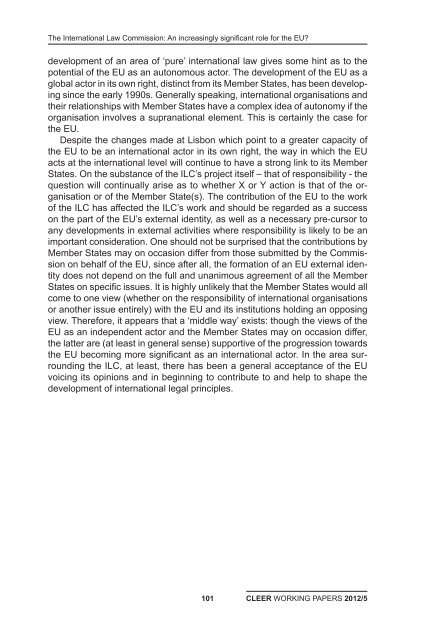Principles and practices of EU external representation - TMC Asser ...
Principles and practices of EU external representation - TMC Asser ...
Principles and practices of EU external representation - TMC Asser ...
Create successful ePaper yourself
Turn your PDF publications into a flip-book with our unique Google optimized e-Paper software.
The International Law Commission: An increasingly significant role for the <strong>EU</strong>?<br />
development <strong>of</strong> an area <strong>of</strong> ‘pure’ international law gives some hint as to the<br />
potential <strong>of</strong> the <strong>EU</strong> as an autonomous actor. The development <strong>of</strong> the <strong>EU</strong> as a<br />
global actor in its own right, distinct from its Member States, has been developing<br />
since the early 1990s. Generally speaking, international organisations <strong>and</strong><br />
their relationships with Member States have a complex idea <strong>of</strong> autonomy if the<br />
organisation involves a supranational element. This is certainly the case for<br />
the <strong>EU</strong>.<br />
Despite the changes made at Lisbon which point to a greater capacity <strong>of</strong><br />
the <strong>EU</strong> to be an international actor in its own right, the way in which the <strong>EU</strong><br />
acts at the international level will continue to have a strong link to its Member<br />
States. On the substance <strong>of</strong> the ILC’s project itself – that <strong>of</strong> responsibility - the<br />
question will continually arise as to whether X or Y action is that <strong>of</strong> the organisation<br />
or <strong>of</strong> the Member State(s). The contribution <strong>of</strong> the <strong>EU</strong> to the work<br />
<strong>of</strong> the ILC has affected the ILC’s work <strong>and</strong> should be regarded as a success<br />
on the part <strong>of</strong> the <strong>EU</strong>’s <strong>external</strong> identity, as well as a necessary pre-cursor to<br />
any developments in <strong>external</strong> activities where responsibility is likely to be an<br />
important consideration. One should not be surprised that the contributions by<br />
Member States may on occasion differ from those submitted by the Commission<br />
on behalf <strong>of</strong> the <strong>EU</strong>, since after all, the formation <strong>of</strong> an <strong>EU</strong> <strong>external</strong> identity<br />
does not depend on the full <strong>and</strong> unanimous agreement <strong>of</strong> all the Member<br />
States on specific issues. It is highly unlikely that the Member States would all<br />
come to one view (whether on the responsibility <strong>of</strong> international organisations<br />
or another issue entirely) with the <strong>EU</strong> <strong>and</strong> its institutions holding an opposing<br />
view. Therefore, it appears that a ‘middle way’ exists: though the views <strong>of</strong> the<br />
<strong>EU</strong> as an independent actor <strong>and</strong> the Member States may on occasion differ,<br />
the latter are (at least in general sense) supportive <strong>of</strong> the progression towards<br />
the <strong>EU</strong> becoming more significant as an international actor. In the area surrounding<br />
the ILC, at least, there has been a general acceptance <strong>of</strong> the <strong>EU</strong><br />
voicing its opinions <strong>and</strong> in beginning to contribute to <strong>and</strong> help to shape the<br />
development <strong>of</strong> international legal principles.<br />
101<br />
CLEER WORKING PAPERS 2012/5

















